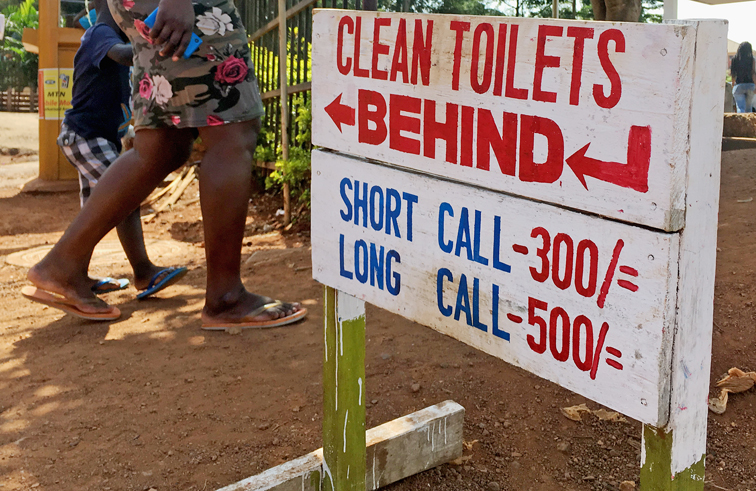
In Mukono, Uganda, a sign advertising pay toilet rates for urination and defecation, one indication of the world’s sanitation crisis.
(Thomas Froese photo)
(The Hamilton Spectator, Saturday, November 23, 2019)
There was a time when I wouldn’t think about the lowly toilet. Nor would I consider the lives that each of us are born into through no doing of our own.
If anything, during these autumn days I’d think about John F. Kennedy, the former US president assassinated November 22, 1963. That was just before my time, true, but regardless, a note in history for me.
For one, JFK fought like a bear to protect Berlin, my native city, and long-time island of freedom, from communism’s shadow. His immortal “I am a Berliner” address to 400,000 Germans showed an unusual bond not seen before or since with any head-of-state and foreign people.
Also, in a Froese family history footnote, my father, a young, respected therapeutic massage therapist, was once requested to meet JFK, then a Boston Senator already struggling with a crippling back condition. But the universe unfolded in other ways. It was the meeting that never was.
Now there are these toilets. That’s right, toilets and all the associated you-know that goes in them. Because this week, on November 19, it also happened to be the United Nations’ World Toilet Day. If you didn’t know, the crisis that’s facing much of the world is this rather uncomfortable and shitty topic.
Pardon the French, but maybe it helps to get into the right frame of mind. What you and I take for granted, a simple pot to call our own, is unknown by more than two billion human beings.
I don’t need to tell you that when you have to go, you have to go. So people without indoor plumbing go where they can: ideally in a pit latrine if nearby, but often in some open field or canal, or ditch, or river, or anywhere, really. And this leads to various diseases – typhoid, cholera and dysentery – that kill especially children. Every year on this planet some 750,000 children die from diarrhea alone. Imagine.
Of course, this is not the sexiest story out there. But if you’ve travelled, really travelled, you know this: when you have to go, your options can be limited. This is now a global sanitation crisis.
About one-in-eight high-schoolers worldwide have no toilet. In India, 500 million rural Indians practice open defecation. Hundreds of millions of menstruating women in developing nations have it particularly hard. Along with delivering mothers.
From rural Uganda, Dr. Jean Chamberlain Froese, my obstetrician wife, once told a UN crowd in New York via video that the East African hospital from where she stood didn’t have one toilet for 4,800 deliveries a year. That’s more deliveries than Canada’s largest hospitals. Not. One. Toilet.
Bill and Melinda Gates have spent $200 million partnering with scientists and universities on one solution, a waterless toilet. There’s Bill at the World Toilet Expo in Beijing last November, standing at the podium holding a jar of feces. Some ten million viruses are inside.
One particular waterless toilet known as a nano-membrane toilet shows some promise. It may possibly be the world’s most significant change in sanitation in 200 years. More of a sewage treatment unit than a toilet, it would dry-flush, burn feces into ash to be emptied weekly like an ash tray, and purify urine enough to be used for watering crops and cleaning livestock.
Such are the creative solutions chased with some desperation. Meanwhile, the UN has trumpeted World Toilet Day since 2013. Last year 40 countries participated with walks and runs and social media campaigns and, of course, toilet cleaning programs. Canada’s feature movie was “The toilet: a love story.”
Getting back to Kennedy, maybe the uniting thought is this: we’re all family. Kennedy, at his best, said this in different ways. We’re family, regardless of where we live. We have certain human needs: for freedom, sure, but also for health and safety and common dignity.
This is what transcends boundaries of politics or geography. This, in our new world, is being our brothers’ and sisters’, keeper. On a plane any one of us is just hours away from any of it.
A reminder, it is, that you, like me, could have been born into a life that’s very different than the one you have: the fortunate, if not luxurious, place from where we happen to sit.

Thank you Thom, for this very sobering piece, which brought back my own memories (a Canadian professor’s wife expecting our second baby) of sitting outside on a bench in Ibadan, Nigeria, in late1975, awaiting my turn with the pre-natal clinic doctor and ‘needing to go’ in the only available outdoor shack. A memorable, and horrible, experience and one to make me constantly thankful for the incredible blessings we have compared to most in our world! Blessings to you and all the family! Chris and Marny
Memorable and horrible. And, yes, for so many.